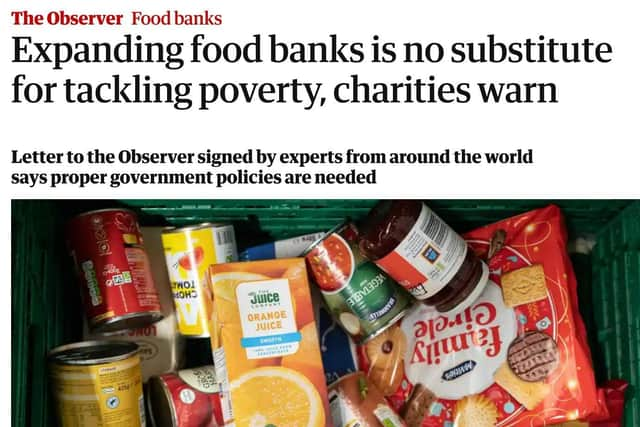OPINION: Why we need more than charity to tackle food poverty
and live on Freeview channel 276
An open letter signed by 180 activists, academics and charity campaigners about food poverty has been published in the Guardian and Observer newspapers on March 26th 2023. The signatories, of which I am one, ask for more than just charity - , however well intentioned, that is no sustainable solution to food poverty. We need improved benefits and wages.
Foodbanks and related services like social supermarkets and food pantries have become part of life in modern Britain. This is because thousands of people, possible around 18 to 20 million nationwide, live in poverty. Many of these people are in work, not just on benefits; and sadly, for a lot of people, work does not pay enough to live on. And benefits have dramatically fallen in value over the last 13 years compared to wages. With steadily rising housing, fuel and other costs, more and more people in Northampton are poor, and this poverty creates other issues, like poor health and a life expectancy locally that is 12 years less than the richest areas of Britain.
Advertisement
Hide AdAdvertisement
Hide AdThis is why food aid has grown exponentially in the UK. Concerned with the scale of poverty around them, caring people, churches and charities have grown an impressive range of food aid services, including in our area. Its become, in some places, an industry.


I have played a role in this, along with others, as a former CEO of a local poverty and homelessness charity, a former board member of one of the national alliances of foodbanks, and also the founder and as the former chair of a local alliance of food aid providers. Given the problems people experience just surviving in the face of real poverty, such services have come to substitute for proper wages and benefits. Charity has replaced the proper role of the state and employers: and it is unlikely that the need for food aid will reduce any time soon.
But charity is not enough, as 180 experts, academics, activists, charities and providers from across the world have joined together to say, in an open letter in the Guardian and Observer newspapers on 26th March. I am one of the invited signatories to that letter. You can read about it here: https://www.theguardian.com/society/2023/mar/26/expanding-food-banks-is-no-substitute-for-tackling-poverty-charities-warn and read the letter here: https://www.theguardian.com/tone/letters.
The signatories ask for real action to improve benefits and wages, to take a 'cash-first' approach to food poverty, giving people enough money to live on so they do not have to rely on charity. Ultimately the signatories want to see an end to food aid. Its not the right solution and furthermore, it can also be an experience many find shameful, which is why so many in need never bother to attend. Being forced to attend a budgetting course, presuming that the poorest are somehow unable to manage their money, is just one example of a requirement that some food aid providers impose on the poorest before they can get help and which deters some from getting help. By all means offer such support it to those who want it, but services should not make it a requirement.
Advertisement
Hide AdAdvertisement
Hide AdSo by all means donate to local food aid charities, and volunteer and support the work of the best providers who are committed to seeing an end to food poverty. But those who want to help, and food aid providers themselves, need to do more: we need to see reduced barriers to getting help; services that do not make judgements about the people who attend; and most of all we need active campaigning and lobbying for social change and structural solutions to the burden the poorest bear.
Every food aid charity, as well as feeding people in a fair, open and non judgemental way, needs to raise its voice and campaign for change, as should all those who support them. Simply taking grants, raising funds, and supplying food without campaigning is not going to change the need for foodbanks. Only with a real commitment and effort to achieve social change will we see the poorest getting the real, lasting help they need.